#harlots 204
Text
Enkidu as Social Lichen
In hierarchically organized cultures throughout history, humans have had a tendency to view themselves as above other creatures and, above all, as individuals. Self-reliant and free-willed, humans have walked the planet and conquered. Or so the story goes. Indeed the human would not have been able to survive without fruits on the trees, the blossoms, the pollen, the bee, the seed, the rain, the sun. Civilizations would have never emerged were it not for the existence of networks of forests (and interdependent mycelium) with which they have built their walls and fields. Even more is to be said on this in relation to divisions of labor within human societies.
We are all like lichens. We are all lichens in the sense that forms of life and their material contributions cannot be separated from one another. Individuals are the algae that lives upon the form provided by our environmental territories of fungus. We exchange the fruits of our labor and consume.
Even one of the oldest stories surviving, The Epic of Gilgamesh, displays this humanist-individualist bias. At the same time, it is not in the slightest exempt in portraying fragments of reality and its characteristic exchanges. This is particularly the case with Enkidu, the creation of the earth goddess Aruru and the agriculture god Ninurta (I.201-204) who is “Coated in hair like the god of animals” (I.209). As a catalyst of the story and Gilgamesh’s counterpart, Enkidu is central to the way the story and the titular Gilgamesh develop and is all the more important to analyze in this symbiotic respect, through the expression of the lichen.
The description of Enkidu’s behavior being shaped by the standards of his environment throughout the text represents Enkidu as a character who evolves to the shape of territories (such as nature and civilization). Despite this, Enkidu maintains a place as a reminder of the inherently symbiotic relationships that characterize material reality with each evolution he experiences.
This paper will analyze Enkidu’s embodiment of social symbiosis through the expression of lichen. First, it will describe the defined fungal territories that Enkidu interacts with over the course of the story. Then, it will demonstrate how Enkidu acts as an algae to the fungal territories of nature and civilization through the way that his behavior is shaped and the way they contribute to each other materially and ideologically. Lastly, we will examine the ways in which the territories of nature and civilization’s attitudes on symbiosis contrast and find similarities in between.
It is worth noting- while lines 94 to 133 of tablet I of The Epic will be a primary object of focus, understanding the motifs of different territories and Enkidu’s interaction with them throughout the text can only be accurately achieved through the consideration of how they are expressed throughout the whole of The Epic.
Territory as illustrated throughout the Epic
Territory is the fungus upon which the individual grows. Words like environment fail to describe the expression of fungus in this sense, because it naturalizes the boundaries surrounding a circumstance. Socially and materially applied, the concept of the environment is actually one of scale with defined boundaries based around certain subjectivities of what falls under certain labels. The term territory recognises this constructed element.
What is considered as nature in The Epic of Gilgamesh versus what is considered as civilization is separated by a very hard-drawn line. [Enkidu has sex with harlot] With the act of sex with Shamat, Enkidu is defiled and the animals who they had lived among their whole life abandoned them (I.1195-1202). Sex in this instance is seen as an impure act, despite it being a natural thing for all kinds of animals to engage in and the harlot being a priestess of Ishtar. Primarily, interaction with the human is what is viewed as causing his defilement. In analyzing Enkidu’s interactions further we will find out why.
Enkidu algae upon nature fungus
From the beginning of his life, Enkidu finds himself growing upon the fungus of nature-as-territory. The impacts of it on his lifestyle are immediate; he lives among the animals as an animal, even resembling them.
Coated in hair like the god of animals,
With the gazelles he grazes on grasses,
Joining the throng with the herd at the water-hole,
His heart delighting with the beasts in the water (I.109-112).
Sharing water with the beasts recognizing its significance to all of them, Enkidu lives like the animal algae around him. He lives with gazelles when grazing upon the grasses and any other sorts of animals at the water hole, not discriminating between different groups and going wherever he needs to be. But he also has a part in maintaining this territorial fungus. In (I.130-133), Enkidu helps the animals through destroying the traps set by a huntsman, slowing the human extension of work in the forests. A sort of sense of empathy is birthed in him through his constant interactions with various different types of animals that pushes him to do this. His understanding of the symbiotic relationships of the herd and the environment is ultimately established this way.
Enkidu algae upon Gilgamesh fungus
After Enkidu meets Gilgamesh confrontationally and becomes close friends with him, Enkidu’s ultimate tie to civilization is formed. Gilgamesh, who is so interested in proving himself worthy to be a god in a hierarchically-obsessed way drags Enkidu into areas where he is not comfortable acting, but their ties are so close in a way where he does so anyways.
Enkidu possesses no [kith or kin.]
Shaggy hair hanging loose……
He was born in the wild and [has] no [brother.]’
Standing there, Enkidu heard [what she said,]
And thinking it over, he sat [down weeping.]
His eyes brimmed with [tears,]
His arms fell limp, [his] strength [ebbed away.]
They took hold of each other and…….,
They [linked] their hands like……
Gilgamesh………, (II.175-184).
Gilgamesh’s decision to fight Humbaba is highlighted as foolish by his mother, Ninsun, who makes the point that Enkidu would be left without family were Gilgamesh to die and that proving his godliness in this way was selfish. Enkidu processes this fact and breaks down into tears, recognizing his reliance upon and care for Gilgamesh. Enkidu ends up fighting Humbaba with Gilgamesh out of more fear or his family than his own self-preservation. Enkidu contributes so much to Gilgamesh’s goal for civilization that he even cuts down Humbaba’s forest, much like the one he would’ve lived in when young, for little more than a sense of companionship.
Enkidu is constantly building Gilgamesh houses to sleep in and out of Humbaba’s forest once all of the trees are cut down (IV.171-174). He is constantly contributing to Gilgamesh’s goals without concern for his own needs and desires out of a sense of closeness to Gilgamesh, his new assumed identity within civilization. Conforming to the shapes of civilization’s fungus hurts Enkidu, eventually killing him as he fights the Bull of Heaven and Ishtar on behalf of Gilgamesh.
Fluid nature versus static civilization
After examining the different ways in which Enkidu was impacted by living a part of nature and civilization territories, it is interesting to look closer at the contrasting attitudes around concepts of symbiosis between the two and the different ways in which resources are allowed to be allocated. For instance, on (I.109-112),
All his body is matted with hair,
He bears long tresses like those of a woman:
The locks of hair grow thick as barley,
He knows not a people, nor even a country.
In Enkidu’s original state, we see a marked absence of identity and a blend of characteristics that would suggest his belonging to three pairs of opposing identity groups. Firstly, the comparison of Enkidu, a humanoid figure, with an animal that is coated in hair. Then a woman, whom Enkidu’s pronouns do not align with. Then, a lack of a formal sense of citizenship despite living with the herd. In (I.105-112),
he is displayed as grazing with gazelles and joining other animals to the watering hole. On the fungus of nature, Enkidu lacks identity outside of Enkidu, of transitioning between groups of animals in nature. Identity in nature is displayed along the lines of change and perceived absence, with fluid groups sharing resources and seeking safety in numbers in a way that has no qualms with expressing symbiotic relationships.
Looking again at the very boundary definer of civilization, the humanistic way that identities and their corresponding roles are assigned can be seen to contrast the way they operate in nature. In (I.1195-1198), Enkidu is shunned by his herd for having sex with Shamat. Shamat is introduced as being a “harlot” almost inherently, with her role having been defined largely for her. In professions, the diverse material needs of the individual are ignored in favor of having people perform one instrumental, unnatural task that has little to do with their willingness to perform it. The way that this denies the basis upon which nature largely functions creates unhealthy situations, like when Enkidu is conscripted to fight against Humbaba by Gilgamesh most reluctantly out of a sense of dependence upon Gilgamesh (II.175-184).
Even the motif of being stripped of the ability to run in adjacence to purity is described.
Enkidu had defiled his body so pure,
His legs stood still, though his herd was in motion.
Enkidu was weakened, he could not run as before,
But now he had reason and wide understanding. (I.1195-1202)
The static and symbiotically denying identities of civilization have been applied to him, and he can no longer be a part of a collective group defined in their fleetness of going from one consumptive or productive identity to the next. He is posited as learning from this, however. He had learned the concept of a static and irrational boundary.
Ultimately similar underlying exchanges of material resources were taking place in both nature and civilization, but the lack of acknowledgement of this in civilization creates exploitable classes like Enkidu whose achievements ultimately are associated with legitimizing Gilgamesh, the one with the exalted identity of King.
Conclusion
In the end, the character of Enkidu is a sobering dose of symbiotic reality in a story full of otherwise humanistic messages. His interactions with nature and civilization display that despite the difference in attitude of the territories towards more fluid symbiotic ideas, they are both ultimately reliant upon its social and material existence. The weight of conforming to different territories can be crushing if the territory views your role as innate. We should all learn from Enkidu’s experience and move ourselves to fungi that allow us to grow and change.
Bibliography
George, A. R. The Epic of Gilgamesh: The Babylonian Epic Poem and Other Texts in Akkadian and Sumerian. Penguin Books, 2020.
11 notes
·
View notes
Photo
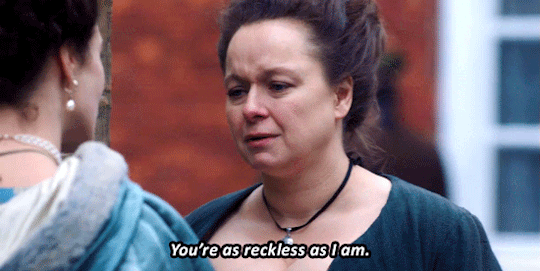

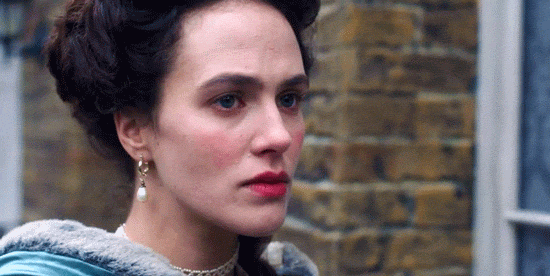
#a moment.... a helluva mama-daughter moment#harlots hulu#harlotsedit#charlotte wells#margaret wells#jessica brown findlay#samantha morton#harlots spoilers#harlots 204#my gifs#op#harlots
183 notes
·
View notes
Photo

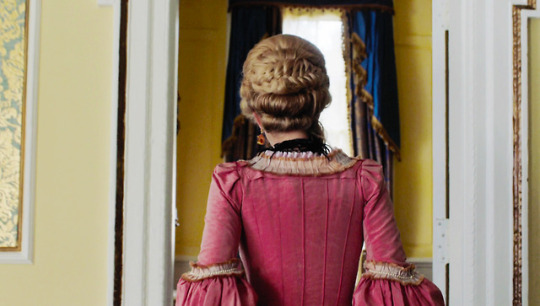

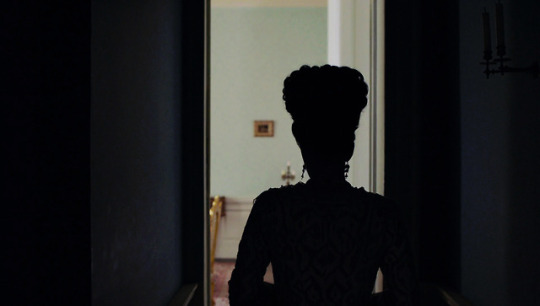

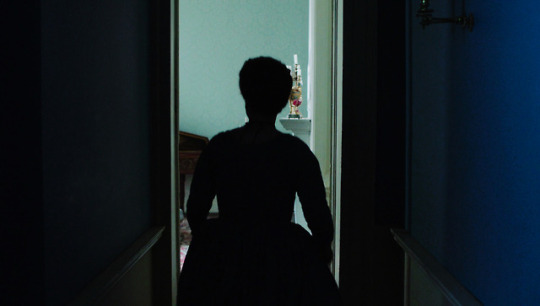

#harlots#itv harlots#harlots: 201#harlots: 203#harlots: 204#harlots: 207#harltots: 208#jessica brown findlay#charlotte wells#samantha morton#margaret wells#eloise smyth#lucy wells#liv tyler#isabella fitzwilliam#💁
93 notes
·
View notes
Photo

Harlots 204 - AKA that time Lady Fitz ruined everything
- Quigley clearly heard (or had someone listening to) the conversation Lady Fitz and Charlotte had in her drawing room. This was incredibly dumb of Charlotte and I can’t believe she had that convo where she did, when he did.
- Lady Fitz... willing introduced Quigley to the one man most likely to be of use to her.
- Basically, Lady Fitz spent this entire episode carrying the idiot ball. Why??? What is the point of setting her up as a potential powerful “friend” if the story is going to go in the direction of “evil men control everything and rich women are dumb”?
- Also, let’s talk about Lucy and Fallon: I can’t decide if Fallon is going to pull Lucy to the dark side... or if she’s going to figure it out and turn on him?
- I’m also really curious where Emily and Charles are going. She’s obviously not in love with him - but I do think she genuinely cares for him (because he chose her, Emily Lacey, over his mum when it didn’t actually benefit him to do so and he has continued to choose her). I think that means a lot to someone like Emily even if she can’t otherwise stand him.
- I am SO EXCITED that Margaret is mending fences and making friends again. I hope she and Harriet sort it out too. Everyone vs. Quigley FTW!
14 notes
·
View notes
Text
harlots theories as of 2.04

I gotta say, I felt pretty gratified by much of the new information we learned this episode — it did a lot to resolve or to strongly hint toward a few of this season’s Burning Questions so far, and mostly in ways that align with what I’ve been expecting! But it also spawned a new theory or two, and I’m ... not really on board with some of the new spec.
But let’s start with the theories I do agree with.
Harcourt Is the Archon
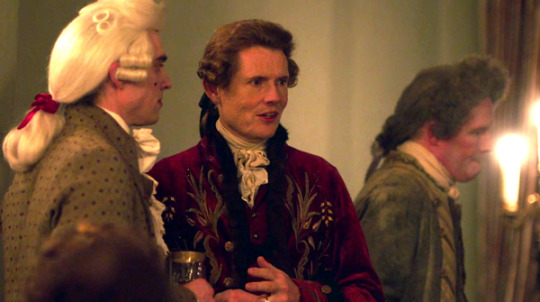
I postulated this after the first dang week of the season, and although the show still hasn’t used the A word to refer to him, this episode has me feelin’ pretty dang confident. He’s now explicitly self-identified as a Spartan, and the extremely assured authority he wields over both Lidington and Fallon indicates that he must be pretty far up the totem pole. Not to mention that this episode confirms a capacity for sexual violence, though that was already hinted at by the way Isabella flinches away from his creepy caresses.
So this one’s not #confirmed as yet, but it’s lookin’ strong.
Hunt + Amelia

Technically this is confirmed by the 2.05 sneak peek, but c’mon, we all saw SOMETHING coming between them from the very beginning. Yes, as many many people have speculated: Hunt’s gonna propose to Amelia. What remains to be seen is the exact motive here. Does Hunt genuinely desire Amelia? Is that what drives his proposal? Or is this more a match of pragmatism — a way to achieve safety and security for Amelia, and by extension Florence? I’ve leaned toward the latter thus far (i.e., that it’s primarily about security rather than romance in and of itself), and my feelings about that were strengthened by Hunt’s offer to help Amelia in 2.03 and, in this episode, by Florence declaring that she and Amelia must find “their own shield” against Lydia.
Isabella Has an Illegitimate Child, and the Father Is...
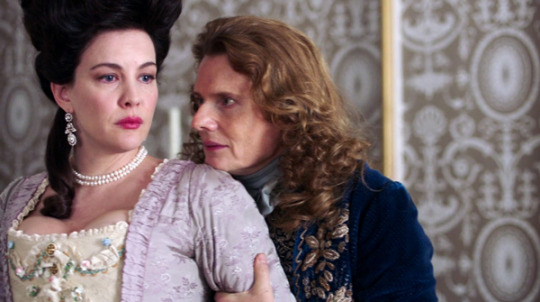
Horribly, I think we’re all pretty sure it’s Harcourt, right.
I’ll admit that I was only 50/50 on whether the kid would even exist. Some hints have been made toward it — Lydia, for example, saying that Isabella’s secret was “growing” by the day — but I was also considering whether her preference for the fairer sex might be a big enough scandal to be the “secret” on its own. Now that we know there IS a child ... This post (not mine) does a great job of exploring possible paternities, so I won’t restate those possibilities here, but considering the way Harcourt is around Izzy, I’m in agreement with what seems to be the popular opinion/fear.
But you know what I reeeeeaaally doubt???
Isabella’s Illegitimate Child Is CHARLOTTE
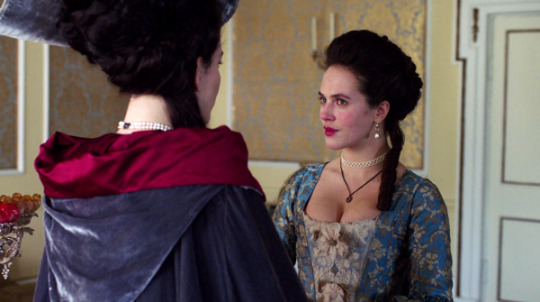
...Look. Is it possible? Sure, I mean, I guess. Liv Tyler is the same age as Samantha Morton. They would both have had to be pretty young when Charlotte was born, but biologically, it could work. But — and no offense to anyone who’s been speculating on it! I’ve speculated in favor of some MAD theories in my time! — this theory is a MESS when it comes to narrative and theme.
Narratively, you have to twist yourself in SO many knots to make sense of it. So, is the idea here that Isabella doesn’t know Charlotte’s her kid? That she gave Charlotte to Lydia at birth? Why Lydia, of all people? And if Lydia was SO fond of baby Charlotte (as Mrs. May tells us in 2.03), why did she give Charlotte to Mags to raise, even though Mags was apparently a very indifferent mother at first? Why wouldn’t Lydia just raise Charlotte as her own? And if Charlotte is Izzy’s daughter but Izzy doesn’t know it, why SEND CHARLOTTE — Lydia’s LEVERAGE AGAINST IZZY — to Isabella, thus ensuring their meeting and risking them learning about their relationship, which would undermine Lydia’s hold on them both??? Not to mention that Lydia and Isabella refer to this child as a CHILD, Lydia refers to it as GROWING, they do NOT speak of it in a way that sounds to me as though it’s a grown-up or that Isabella doesn’t know who it is. If she DOES know who it is and it IS Charlotte, then ummmmm okay, Izzy sure is KNOWINGLY sending her daughter roses and flirting with her and kissing her on the mouth! That sure is a thing!
And even if it somehow works narratively ... Thematically, I hate it. Charlotte’s relationships with her mother and with Lydia as a mother figure are immensely complicated, a complication enhanced by the twisted codependence and trauma of Mags and Lydia’s own mother-daughter-esque relationship. But that network of relationships is complicated in a way that all makes sense. It all feeds into each other. It’s really wonderfully well drawn. Retroactively shoehorning Isabella into that tightly interconnected network of histories and relationships would be really out of place.
Not to mention that if Harcourt IS the father of Isabella’s child, it would mean that Charlotte is not only kissing her mother but FUCKING HER FATHER and PLEASE, Harlots, can we not.
Watch me look like an absolute fool if this somehow becomes canon in the next couple weeks, but I will NOT be any better pleased about it.
#harlots hulu#charlotte wells#isabella fitzwilliam#lydia quigley#josiah hunt#amelia scanwell#harcourt#harlots meta#my meta#harlots spoilers#harlots 204#op#harlots
78 notes
·
View notes
Note
I kind of don't doubt Fallon would kill Lucy the second he finds her 'boring.' I also kind of think he's grooming her though? There's plenty of cases of serial murderers getting their romantic partners in on it. And his whole Hades/Persephone thing... I hope he doesn't try and get Lucy to kill live organisms next O_O

“You have an instinct for violence. I can see that in you. I want to show you how to use it.”
Fallon is absolutely grooming Lucy. He’s been doing it since season 1, episode 5 (the Pomegranate Incident). Something about Lucy captured his interest in 1.04, and right away, he sets about trying to corrupt this “rare and delicate” fruit, trying to seduce her into his keeping — and his interest is only piqued FURTHER every time she shoves him away.
For the Spartans, sex and violence are intimately linked. I don’t know if this is a proclivity he shares with his peers, but Fallon, at least, seems to enjoy not only inflicting violence but receiving it (in a limited measure, of course). He laughs when Lucy shoves him; he arms her so that she may better fight him; he is aroused even further by the thrill of his blood on her tongue. It is a game of thrust and parry, of teasing and refusing, of small hurts. He is trying to seduce her into his lavish lifestyle and to train her to associate sex with violence like he does — and I, too, suspect that his HOPE is to groom her into a partner he can not only spar with privately but who will join him in the Spartans’ games.
…He’s going to be disappointed, I think. I hope. A bit of sexy swordplay as foreplay is one thing, but Lucy is no monster. She has been raped and abused herself, and though Nancy taught her to channel some of that trauma into lashing out at inanimate objects as proxy culls, I don’t think Fallon will be able to get her to lash out at helpless girls. Whatever her initial misgivings about Fallon, I don’t blame her for being intrigued and enticed by him for now, but she does not yet KNOW the terrible truth of what he is.

Even Persephone does not remain in Hades past the season. I look forward to Lucy’s escape.
#harlots hulu#lucy well#lord fallon#harlots meta#my meta#harlots 204#op#grooming#rape mention#asks#wolfwars#harlots
69 notes
·
View notes
Note
Have you seen harlots on Hulu blog? They have been posting a lot of stuff, but like they replied to my ask and said they got jarred by Lord Fallon and Lucy in this last episode. Do you know what they mean? What did they see? I feel like I have missed something.
Sorry, but as a general rule, I don’t really like to be asked to comment on other blogs’ opinions about these sorts of things, especially not via asks rather choosing to engage with their posts on my own. I’m not even gonna look for the post you’re talking about. If you want my own opinions on Lord Fallon and Lucy, I can give them, but I can’t speak for any other blog or clarify what any other blogger might have meant.
But as for what I saw: What I saw between Lucy and Fallon was what I expected to see. Two people playing a game on a dangerously unbalanced game board in which one of them holds the VAST majority of real power AND is the only one who really knows all the rules. Oh, sure, it’s fun to watch Lucy be saucy and bossy and seem to have Fallon whipped. Oh, sure, there’s some dark, dangerous chemistry. I expect there’s an element of real desire growing between them both. But none of that changes what Fallon is, what he has done, why he picked Lucy in the first place, what he could do to her if she stops entertaining him, and the fact that he holds all the real socioeconomic power here while Lucy has no idea of the horrible shit he’s involved in.
24 notes
·
View notes
Photo
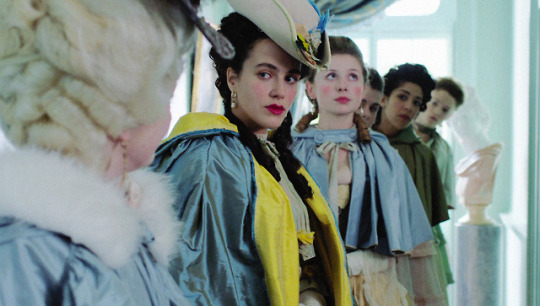


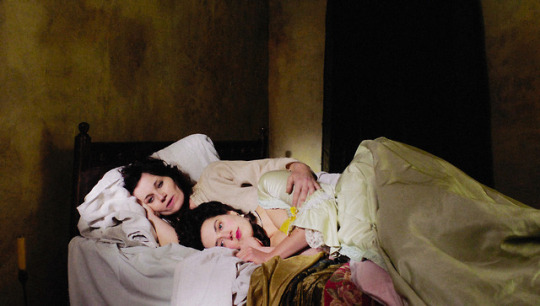
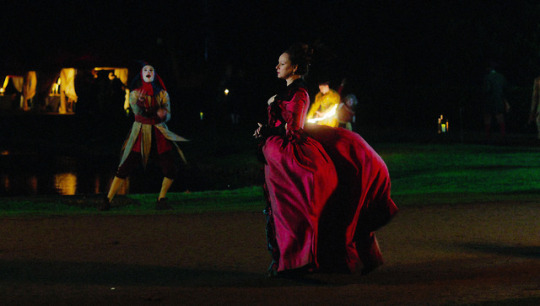

#harlots#itv harlots#harlots: 204#lucy wells#eloise smyth#sam#samantha morton#charlotte wells#jessica brown findlay#nancy birch#kate fleetwood#holli dempsey#emily lacey#rosalind eleazar#violet cross#jordon stevens#amelia scanwell#lesley manville#lydia quigley#💁
30 notes
·
View notes
Note
So I feel like in that moment with the Justice and Lydia and Hunt coming in... I feel like if one pauses just right you can pinpoint the exact moment Hunt’s soul attempts to leave his body followed by the exact moment his souls dies... poor baby! That’s like walking in on your Grandparents.....
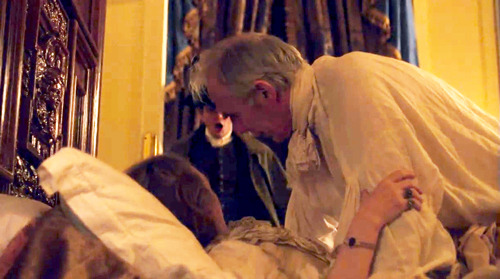

rip josiah hunt
#harlots hulu#josiah hunt#lydia quigley#justice dodds#harlots 204#op#harlots spoilers#asks#lord-pirate-and-gentleman#harlots
73 notes
·
View notes